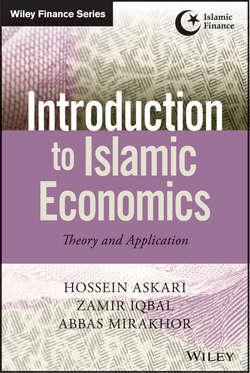Читать книгу Introduction to Islamic Economics - Mirakhor Abbas - Страница 19
На сайте Литреса книга снята с продажи.
Chapter 2
Foundation of the Islamic Economic Paradigm
Impact of Scarcity
ОглавлениеThe agent-trustee duty of humans is central in the Islamic economic vision for a number of intertwined reasons. Conventional economics doctrines focused on scarcity and unlimited human wants as the central reason for the study of economics. Economic growth is presumed to create wealth and thus relax the scarcity constraints. While scarcity is a serious constraint in a world of unlimited wants, it is not so in Islamic vision. The Creator has provided humankind with sufficient resources at the global level to satisfy all human needs if humans follow His rules. The creation of the earth was not a random event. Allah (swt) created the earth by incorporating human needs and creating conditions (as a test) that require humans to share.
In Islam, scarcity takes on three different aspects. First, the Quran repeatedly asserts that from a macro-global standpoint, Allah (swt) has created all things in “exact measures” (Quran 49:52), indicating that the Lord Cherisher, sustainer of all creation, provides sufficient sustenance for all in His creation including humankind. The Quran, however, recognizes two other dimensions of scarcity. It acknowledges a micro-actual scarcity stemming from misdistribution of resources and from greed and gluttony. Hence, one encounters in the Quran the overwhelming emphasis on social justice and rules against waste, accumulation of wealth, and extravagance. The third concept refers to the real scarcity arising from the fact of finite conditions of man on this plane of existence. The physical conditions of man impose a finite constraint. “Man is finite, mortal and aging, limited in time and space.”26 Becoming aware of these constraints as well as of the potentialities of the human state, human consciousness, once awakened, not only allows humans to grasp potentialities but also permits the human realization of them and the ability to transcend the limits of their physical existence to imagine what is and what could be. Humans, thus, realize that their physical existential constraints impose limits on how much of their potentialities they can actualize; they must then “choose between the alternatives grasped by transcending consciousness.”27 The third notion of scarcity dealt with in the Quran is this “existential scarcity” arising from the finite conditions of humans on this physical plane of existence. The Quran's constant reminder of limitations of time on this earth and the rapidity of its passage is symbolized by the question humans are asked on their transition to the next level of existence. They are asked, “How long did you spend on the earth?” and their answer is “A day or part of the day!” (Quran 18:19). Similarly the Quran clearly and repeatedly reminds humans about the natural aging process that erodes their physical and mental abilities (Quran 68:36; 70:16). The existential scarcity caused by the finite conditions of existence of humans on the earth “leads to an allocation problem of scarce means to alternative ends…the resources which are ultimately scarce are life, time and energy because of human finitude, aging and mortality.”28
Thus there can be scarcity because some humans are selfish, hoard, and do not share with others who are less fortunate, because some humans have excessive wants, or because some humans are lazy and do not work hard enough. Thus scarcity can be a factor only at the local level because some people are taking more than their fair share of resources. While self-interest is fully recognized in Islam, it must be subservient to social interest. Human wants and preferences cannot be accepted as a given but must be shaped to reflect Allah's (swt) intentions for humankind. Conventional economics assumes that humans have unlimited wants and takes this as a given; Islam abhors greed and selfishness and sees them as traits that must be changed. Conventional economics assumes unlimited wants and emphasizes economic growth and material output for human happiness; Islam emphasizes the spiritual. Humans who live in regions with high per capita incomes are not any happier than those in poorer regions, because those living in rich areas invariably focus on their relative material position and, more generally, wealth does not by itself bring happiness. The sharing of material output with the less fortunate is of spiritual importance and brings about inner joy to those who share and should not be seen as charity. It instead supports the unity of humanity and protects the rights of those who for reasons beyond their own control are deprived. Allah's (swt) bounty to humankind has other important dimensions. Allah (swt) is the Ultimate Owner of His Own Creation that is intended for all humankind of all generations. These gifts, such as all depletable resources, water, land, and the environment, generally must be managed in trust so that the rights of all humans of this and future generations are preserved.
Конец ознакомительного фрагмента. Купить книгу
26
Weisskopf (1971, pp. 22–23).
27
Ibid.
28
Weisskopf (1971, pp. 22–23).
